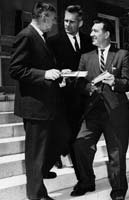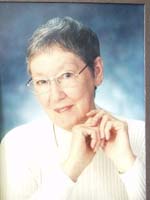Desmond Pacey
Categories: Male Authors - Anglophone Authors - Authors of Juvenile Fiction; - Novelists - Authors of Non-Fiction - Illustrators - Saint John River Valley

Source: University of New Brunswick Archives
Biography
Dr. William Cyril Desmond Pacey was born in Dunedin, New Zealand, on May 1, 1917. After his father was killed in World War I, Pacey and his mother emigrated first to England, and then in 1931 to Canada. They settled on a farm in Glanford Station, Ontario. He married Mary E. Carson in 1939, and the couple had 7 children.
Pacey attended Victoria College, University of Toronto, for a Bachelor of Arts in English and Philosophy, and completed his doctorate at Cambridge University in 1941. He came to the University of New Brunswick in 1944, where he initiated studies in Canadian literature, and served in a succession of administrative roles, including Dean of Arts, Dean of Graduate Studies, Vice President Academic (1970), and from 1972-1973 served simultaneously as Acting President. He taught until his death in 1975.
By the 1950s Pacey was established as one of Canada’s leading literary critics and historians. His scholarly works including Frederick Philip Grove (1945), Creative Writing in Canada: a Short History of English-Canadian Literature (1952, 1961, 1966), and Ten Canadian Poets: a Group of Biographical and Critical Essays pioneered changing attitudes towards Canadian literature. Internationally acclaimed as a literary critic, he was instrumental in promoting Canadian literary studies at UNB and throughout Canada, and a popular speaker at both scholarly and informal conferences. Other key works he edited include Essays in Canadian Criticism (1969), Selections from Major Canadian Writers: Poetry and Creative Prose in English (1974), and Literary History of Canada (1965 – co-editor).
Pacey was also a creative writer, the author of three children’s books and a selection of short stories, as well as book, film, and play reviews. One of his life-long passions was to preserve the literary legacies of local Fredericton poets including Bliss Carman and Sir Charles G.D. Roberts. He edited The Selected Poems of Sir Charles G.D. Roberts, 1860-1943 (1956, 1974), and had obtained a Canada Council for the Arts grant to research and publish a scholarly edition of the collected poems and letters of Roberts; however this work was halted by his death.
Pacey’s achievements were recognized throughout his long and distinguished career. He was elected a Fellow of the Royal Society of Canada in 1955, and awarded the Lorne Pierce Medal of the Royal Society of Canada in 1972 for his “distinguished contribution to Canadian literature.” He was awarded honorary degrees by both Mount Allison University and the University of New Brunswick in 1973. Author, pioneer Canadian literary historian and critic, educator, and administrator, W.C. Desmond Pacey died in Fredericton, New Brunswick, on July 4, 1975.
How has New Brunswick influenced your work?
Here is Desmond Pacey, describing A. S. P. Woodhouse’s reaction to the popularity of the first conference session devoted to Canadian Literature, in 1952, a session Pacey helped organize:
“Good heavens, Pacey,” he said, “Something is very wrong. Two centuries of English literature—and only a handful of people. And on the other hand Canadian literature (said in a tone of supreme disdain)—and just look at the mob!”
“I’m terribly sorry, sir,” I said…
|
Literary Prizes |
|
|---|---|
| Desmond Pacey Lecture series established at University of New Brunswick - 1981 | |
| Honorary doctorate, University of New Brunswick - 1973 | |
| Honorary doctorate, Mount Allison University - 1973 | |
| Lorne Pierce Medal, Royal Society of Canada - 1972 | |
| Fellow of the Royal Society of Canada - 1955 |
|
Featured Publication |
||||
|---|---|---|---|---|
|
The Picnic and Other Stories (1958) |
Excerpt: Another night passed; Sunday dawned dull and cold. A slow, unceasing wind mourned around the house, and sent the branches of the elms into a melancholy dance. Again the boy slowly circled the fields, but he knew it was no use looking there. In spite of his uncle’s warning he drew closer and closer to the river. He came to the pasture and to the creek where he and Tom had sailed the boat. In the grey light of the November afternoon he stood on the plank bridge where they had launched her, and looked towards the river. He could see his uncle and the three neighbours, dragging the dark water from an old rowboat. Suddenly he heard a shout from the boat, and saw the seated men spring to their feet. They were hauling something from the water. They began to row toward the shore, and he ran down beside the bank of the creek to meet them. He stood on the shore of the river and waited, as he had waited when Tom waded after the boat. The men did not notice him, so intent were they on the object in the bottom of their boat. From "The Boat" |
|||
Find this author in the New Brunswick public libraries catalogue.
Source(s):

